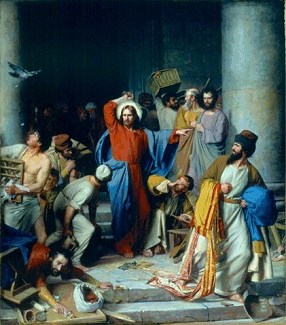I just read the following article in the Lausanne World Pulse, a monthly magazine on missions. I share this because it spoke to my heart. I pray it will speak to yours as well.
The Worse of Two Worlds: For the Sake of Those Who Have Never Heard
By Ferdinand Nweke
The First of Nine Wives Mama Lotun is the first of nine wives; she is Pokot. She lives in Orus (Kenya), a cluster of villages, some made up of only four huts. She was one of the earliest Pokot to put their trust in Christ when missionaries came calling decades earlier.
Hearing that her aged husband was ill, we went for a visit. We had to bend very low to get through the entrance of his hut—like a camel passing through the eye of a needle. He lay on one of two “beds” (piles of sticks) coughing and spitting on the floor or the wall, whichever was more convenient. He let out some groans as he shifted to some more comfortable position on his “mattress” (cow hide).
The putrid smell was inescapable. In the middle of the hut, a fire burned, pouring smoke, tearing our eyes, and choking us. Breathing was difficult: this was no place for a claustrophobic or asthmatic. But the Pokot didn’t seem to mind at all: they were used to the fire: they stoked it, cooked their meals on it, and used it to heat their hut on many chilly.
The old man was living out his last days in the most squalid condition imaginable. I had seen poverty in other parts of Africa, but nothing like this. Through the smoke and stench of the dark, dank hut, we shared the love of Jesus with him. Although neither hostile to the gospel, nor prohibitive of his first wife’s faith, he’d refused to believe, despite years of faithful witness.
Tonight was different. With newfound conviction which suddenly energized his weak voice, he excitedly declared his faith in Christ and prayed with us to ask Jesus to save him. We asked the Lord to heal him and gave him The Treasure, the amazing, solar-powered, audio Bible that will continue to bring him the message of God’s love in his own language.
I was in Orus as part of an international team put together by World Mission ministering to the nomadic Pokot people. On one memorable evening, the Pokot speared a goat to death and roasted the meat for us. They drank the raw blood mixed with fat and ate some part of the goat intestines unwashed and raw. We slept with them in their mud and straw hut (a puny shelter from the howling wind) and preached the gospel to them. Several came to Christ.
Many primitive practices are still performed among the Pokot, including polygamy and female circumcision. The mother of a freshly-circumcised girl even gets to have a feather stuck in her hair. Until recently, the Pokot engaged their neighbors (the Samburus and the Turkanas) in fierce, internecine wars, often over cattle. These three tribes are among the earth’s 2.7 billion unreached peoples who will have the worst of two worlds unless their eternity is secured through the gospel.
Two Worlds
Every individual will experience two worlds. At his trial before Pilate, Jesus told the governor, “My kingdom is not of this world” (John 18:36), implying another world no less real. Paul declared, “If our hope in Christ is good for this life only and no more, then we deserve more pity than anyone else” (1 Corinthians 15:19, emphasis mine). There is this world and the next; one in time, the other in eternity.
There can be no vacuum in our hearts; we must live for time or eternity, for the ephemeral or the eternal. The believer’s ultimate destiny is to spend eternity in glory with Christ. No wonder the psalmist prayed, “You shall guide me by Your counsel; and afterward You will take me to glory” (Psalm 73:24).
There is an afterward: beyond time lies eternity. To not spend eternity with Christ is the ultimate disaster, the mother of all calamities that can befall a person. Better not to have been born than to live on earth and miss heaven. The subject of eternal punishment is not popular in a relativistic world bereft of absolute truth. But something serious made it necessary for Christ to die a shameful death on a cruel cross. Eternity was at stake. Our destiny hung in the balance, but the love of God devised Calvary to save humanity.
The hell of hell is this: that the real problem of hell is not the fire, torment, or lack of food, water, or rest, but that it is forever. If only there was an expiry date to the torments of hell. The only hope of hell’s inhabitants is to pray for God to die, for that is when eternity will end. Since an immortal God is absolutely exempt from death, it implies that the lost will suffer eternal punishment as long as God is alive: “These shall go away into everlasting punishment” (Matthew 25:46).
The price Jesus paid on the cross makes this completely unnecessary. Instead of quibbling over the immutable truth of God’s word, we must do whatever it takes to carry the saving message of Jesus Christ to those who have never heard so that people like the Pokot of Kenya, the Fulani of Nigeria, and the Yadav of India will not have the worst of two worlds.
The Poorest of the Poor
The unreached peoples of the world are also the poorest of the poor. The gospel has positive socio- economic effects, lifting communities that receive it out of poverty and squalor. Until the gospel arrives, however, the existing spiritual darkness usually crystallizes into tangible, multidimensional darkness— physical, economic, sociological, etc.—thereby enslaving the people.
Demonic oppression is rife: some are hard to even believe, like invisible spirits stoning people in Orus. Or the practice (until recently among the Zarandawas of northern Nigeria) of putting holes on both lips of women and sewing their mouths shut so they don’t eat the groundnuts that are to be planted in the farm. Truly, “the dark places of the earth are full of the habitations of cruelty” (Psalm 74:20).
According to the Joshua Project,
The 10/40 Window is home to the majority of the world's poor. Of the poorest of the poor, more than eight out of ten live in the 10/40 Window. On average, they exist on less than a few hundred dollars per person per year. It has been said that “the poor are the lost, and the lost are the poor”...There is a remarkable overlap between the poorest countries of the world and those that are least evangelized.
The Hope of the Poor
Jesus specifically spoke of the gospel being preached to the poor: “The Spirit of the Lord is upon me, because he has anointed me to preach the gospel to the poor” (Luke 4:18). He told those sent by John, “the poor have the gospel preached to them” (Matthew 11:4-5). Or, as The Message translation says, “The wretched of the earth learn that God is on their side.” Often, not even their governments are on their side, but through the gospel, the poor learn that God is on their side.
Quite literally, the gospel (not the porous promises of poverty alleviation from populist politicians) is the only hope of the poor: “Give ear, my dear brothers; are not those who are poor in the things of this world marked out by God to have faith as their wealth, and for their heritage the kingdom which he has said he will give to those who have love for him?” (James 2:5-6).
If they don’t get the good things of this life, and never get to experience Sentosa Island (Singapore), Hawaii, or Disneyworld, what awesome comfort it will be to “have faith as their wealth” and the kingdom for their heritage—to know the Savior here and afterward spend eternity with him in glory!
But to live in grinding poverty on earth and still spend eternity apart from God is double tragedy. The poor won’t go to heaven simply because they are poor or the rich to hell on account of their wealth. Both must have saving faith in the finished work of Christ. But for the poor, it’s the only way to avoid the worst of two worlds.
The story of the rich man and Lazarus comes to mind:
There was a rich man who was dressed in purple and fine linen and lived in luxury every day. At his gate was laid a beggar named Lazarus, covered with sores and longing to eat what fell from the rich man's table. Even the dogs came and licked his sores. (Luke 16:19-21)
The tables were turned when both slipped into eternity: the rich man found himself in torments, whereas Lazarus was comforted. When the rich man begged for a drop of water to cool his tongue, Abraham told him, “Child, remember that in your lifetime you got the good things and Lazarus the bad things...Here
he's consoled and you're tormented” (Luke 16:25). The rich man on earth had become a pauper in eternity.
The Worst of Two Worlds
While it is desirable that everyone get the best of two worlds (i.e., enjoy prosperity on earth and still spend eternity with Christ), the least we must ensure is that those who live in temporal misery on earth must not end up in eternal misery. Instead of letting luxury lull us to lethargy and slumber, those of us whose eternal destinies have been secured by faith in Christ must sacrifice some of our comfort to free up the resources that can make a huge difference for the wretched of the earth.
It was tragic that Lazarus had it rough on earth, but it would have been infinitely more tragic if he had had the worst of two worlds.
To live in places like Orus and then spend eternity in the lake of fire is not acceptable. We are not called to die on Calvary: the sacrifice of our lives can’t save the camels I saw in Orus or the cows of the Fulani. Only Jesus could pay the full penalty for the sins of the world. But it is not his responsibility to preach what he purchased: that’s our job.
We must lay our lives and resources down for this supreme agenda of heaven on earth. We must mobilize every strategy that sanctified minds can fathom, give everything over our real needs, and do all we can so that by all means we can change the eternal destinies of the unreached peoples of the world.
Who knows if in the process of changing their eternal destinies, we could also enrich their lives in time with the good things that accompany salvation. Then they in turn will extend to others the boundless love that lifted them from among the wretched of the earth.
Dr. Ferdinand Nweke, a medical doctor in Nigeria, coordinates Eternity Ministries, which focuses on maximizing Calvary and living with eternity in view. He has authored several books and songs.









